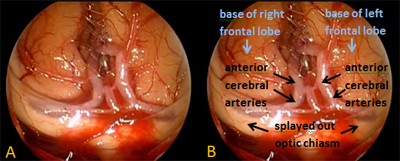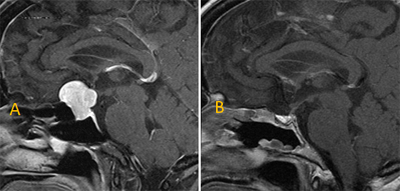Presented by:
Alan R. Turtz, MD, FACS
Director, Pituitary Tumor and Neuroendocrine Program
Marc J. Laufgraben, MD, MBA
Division Head, Endocrinology
Nathan A. Deckard, MD
Director, Rhinology, ENT Allergy and Skull-Base Surgery
The Pituitary Tumor Center at Cooper University Hospital is a cooperative program whose neurosurgeons have more than 50 years of combined experience in pituitary surgery, and have the longest experience with endoscopic pituitary surgery in the Delaware Valley. The team includes highly skilled, fellowship trained otolaryngologists with expertise in skull base surgery; a large division of experienced and specialty trained endocrinologists; radiation oncologists with a focus on both the Gamma Knife and CyberKnife; and experienced neuroradiologists, pathologists and specialty nurses, all of whom participate in the program’s regularly scheduled multidisciplinary pituitary tumor conference.
To refer a patient, please contact the Cooper Neurological Institute at 856.968.7965.
LP is a 67 year-old woman who presented to her ophthalmologist with a one month history of blurry vision and found to have bi-temporal defects. An MRI scan identified a pituitary macroadenoma with severe compression of the optic chiasm (Fig.1A). She underwent an endoscopic transsphenoidal resection of the tumor. Intraoperatively, a large defect in the diaphragm sella was observed requiring dissection of the tumor off of the optic chiasm, anterior cerebral arteries and basal frontal lobes (Figure 2). There was 70% improvement in her vision 6 weeks after surgery. A postoperative scan revealed a gross total resection of the tumor (Fig. 1B)

The Pituitary Tumor Center at Cooper University Hospital is a cooperative program whose neurosurgeons have more than 50 years of combined experience in pituitary surgery, and have the longest experience with endoscopic pituitary surgery in the Delaware Valley. The team includes highly skilled, fellowship trained otolaryngologists with expertise in skull base surgery; a large division of experienced and specialty trained endocrinologists; radiation oncologists with a focus on both the Gamma Knife and CyberKnife; and experienced neuroradiologists, pathologists and specialty nurses, all of whom participate in the program’s regularly scheduled multidisciplinary pituitary tumor conference.

